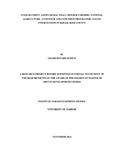Food security among rural small holder farmers: national agriculture, livestock and extension programme (NALEP) intervention in Bobasi, Kisii county
Abstract
Food security is an essential element of overall human well-being. This study assesses how
and the extent to which National Livestock and Extension Programme (NALEP) has created,
strengthened and enhanced the innovative and productive capacities of the smallholder rural
farmers to attain self-sufficiency levels in food security requirements.The study analyzed the
characteristics of small holder rural farmers households; the influence of NALEP
interventions on current capacity for food security among the smallholder farmers; and
lastly, the strengths and weakness of the NALEP interventions .
The study adopted both quantitative and qualitative research approach. Multi-stage and
purposive sampling techniques were used to select the respondents. The study utilized both
primary and secondary data; and thematic analysis technique of data analysis.
The study draws four key findings. First, Smallholder rural farmers’ households display
diverse socio-economic and demographic characteristics. Second, food security differences
cut across gender, age, and income sources. Third, the biggest strength of NALEP has been
the formation and capacity building of grassroot farmer organizations in form of the
Common Interest Groups (CIGs). Through these groups the farmers have been able to
survive difficult challenges and increase their individual incomes. The study findings however
did not establish any organization that provided capacity support in monitoring and
evaluation; and lastly, by involving local farmers in the Focal Area Development Committees
(FADC) and educating them in new farming technologies have shown to be another
successful strategy.
The study suggests three key recommendations for policy. First, while connections between
research and extension are often problematic as their roles can appear to be overlapping,it is
recommended that in order to ensure a certain level of relevance in their work, the research
service will have to rely on extension workers to screen and field test solutions together with
farmers and on the farm. This aspect is particularly relevant in relation to crops that may be
suitable for the poorer segments of the farming communities. Second, the study recommends
that an attempt should be made to formalize the mandate of the Stakeholder Forum, using the
mandate of the Ministries of Agriculture to reinforce the coordination of all entities working
in rural development towards a more efficient use of resources in this area; and finally, it is
recommended that a comprehensive monitoring and evaluation system is designed and
implemented. The M&E system should embrace activities and results related both to
production as well as cross-cutting issues related to gender, age and education.
Additionally, the study suggests three recommendations for further research. First, this study
was based on household survey data using a small sample, which cannot provide conclusive
insight into how households move in and out of food shortages across time. Therefore a
longitudinal study using panel sets with a larger sample is more likely to bring out the bigger
picture. Second, a study on the sustainability of NALEP as a development intervention be
carried out, noting that NALEP is a measurable and time-bound intervention in its last phase
under NALEP-SIDA. Third, the study recommends for replication of the studies be carried
out in other areas of Kenya where NALEP intervention exist to establish variations in
strategies employed, and the outcome of household food security interventions on household
food security.
Publisher
University of Nairobi
Description
Thesis

